| Read
BOOKS, TRAVELS and INTERNET. See our new INYT
sections devoted to books, travel and internet
sites. |
| Missing Shakespeare: after ten years
the stolen First
Folio resurfaces in US |
 |
For 10 years, Interpol had
been watching for the reappearance of one of
Britain's great literary treasures, a First Folio of
Shakespeare's complete plays, printed soon after his
death, worth around £15m. Part of a Durham
University collection, the work had been stolen in
1998, along with early handwritten manuscripts
bearing an English translation of the New Testament
and a fragment of a poem by Chaucer, from a public
display charting the progress of English literature
from the Middle Ages to the 20th century. The trail
remained cold until an international businessman,
who claimed to have bought the collection of 36
plays in Cuba, walked into a library in Washington
DC and asked staff to verify it as genuine. A
spokesman for Durham police said yesterday the man
was persuaded to leave the book for research by
librarians, who quickly linked it to the Palace
Green robbery in the shadow of Durham cathedral.
Back in Washington, Tyne and
Wear, on Thursday afternoon, and arrested a man
after a liaison with the FBI and a call from the
British embassy. Neighbours described the man, named
locally as Ray Scott, as a "slightly eccentric"
character who had lived with his elderly mother for
years and who owned a Ferrari, but seldom drove it.
Mik Kennedy, who lives next door to Scott, said
police had since removed eight vanloads of books and
photographs from the man's house. He described Scott
as eccentric, adding: "He's the last person anyone
would expect to be involved in something like this."
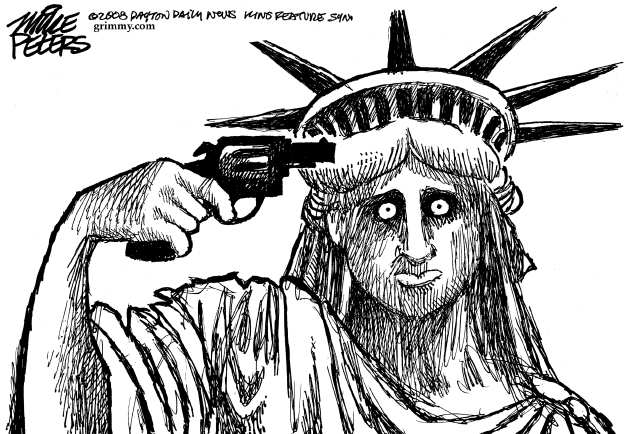 |
| The state of
the Union? |
| Neighbours
believed he sold old books on the net.
Detectives are now questioning Scott about
the "international businessman" who turned
up across the Atlantic, in the other
Washington, with one of the world's most
valuable books. The stolen volumes have been
described by Durham University as "a unique
and irreplaceable part of the region's
heritage which will be virtually impossible
to sell to legitimate buyers". The
university expressed delight yesterday at
its recovery after so long. "Like
Shakespeare himself, this book is a national
treasure, giving a rare and beautiful
snapshot of Britain's incredible literary
heritage," said Bill Bryson, Durham's
chancellor. The vice-chancellor, Prof Chris
Higgins, said: "Staff and the community felt
a huge sense of loss when the books were
stolen, so you can imagine my excitement
when I received the call from the police to
say the First Folio had been found. "Durham
University is custodian of many priceless
historic treasures." The First Folio is one
of 228 of the original 1,000 copies that are
known to have survived. All are highly
valued. Only two are in private ownership, a
situation which before 1998 was seen as
effective protection for library and
institutional copies, because of the
impossibility of open market sale. Det Supt
Andy Reddick, who is leading the inquiry,
said that there was no suggestion at the
moment that the seven other items stolen
from Palace Green had been found - they
included a first edition of Beowulf and a
manuscript of the life of the Anglo-Saxon
saint Aelfric. Reddick added that the folio
was in the care of the Folger Shakespearian
Library in Washington DC. It is expected to
be returned to Durham shortly. Prof Higgins
said: "Our security has been very
significantly reviewed and enhanced to the
highest standards since the theft 10 years
ago and we are confident the First Folio
will be safe when it arrives back in Durham.
We also very much hope that the other books
stolen at the same time will be found soon."
The First Folio is the first published
edition of the collected works of
Shakespeare. It was published in 1623, seven
years after the playwright's death. The
folio includes 36 plays, 18 of which,
including Macbeth, had never been printed
before. Without the First Folio many of
Shakespeare's plays would probably have been
lost forever, earning it the title of, "the
most important work in the English
language". On its publication, the folio
sold for £1. It now has an estimated value
of £15m. |
|
|
| BULLS ON
THE RUN |
| It's not only
in Pamplona that the bulls are on the
run. Wall Street has officially entered
into a bear market |
| What about the
Bradford & Bingly? Would you keep your
money there?
|
|
| EL CAMPION |
|
 |
|
Nadal cries victory at
Wimbledon against world number one Federer. |
 |
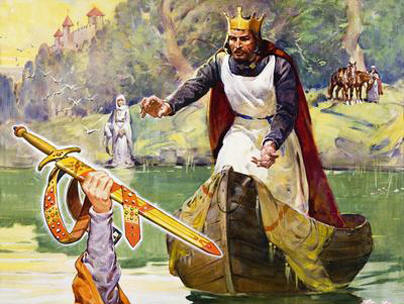 |
| Even if a character
who vaguely resembled the fabled leader did
exist, he would probably have been a Welshman
with strong connections to Brittany and whose
sworn enemies were the Anglo-Saxons. The
organizers of a conference and exhibition to be
held at Rennes university in northern France
next month said they will provide ample evidence
that the Arthurian legend has continually been
updated, often as a sop to English nationalists
attempting to revive the Age of Chivalry.
Typical was the Victorian Poet Laureate Alfred
Lord Tennyson, who at the height of the British
Empire portrayed Arthur as a thoroughly decent
Englishman whose manly virtues and trusty sword,
Excalibur, were directed towards establishing
heaven on earth. Sarah Toulouse, curator of the
Rennes exhibition, said: "King Arthur is a
mythical character who was invented at a certain
point in history for essentially political
reasons. "If he had really existed there would
be more concrete historical traces of him. The
earliest fragments of the tales can be traced
back to Wales in the seventh century. But by the
13th century stories based on the Arthurian
legends were being told right across Europe. The
tale of a knight repelling the hated
Anglo-Saxons from Britain's West Country in
around AD500 has always been popular in northern
France, with Arthur and his Knights of the Round
Table particularly popular with the Bretons. Sir
Lancelot, the best known of Arthur's Knights of
the Round Table, was said to have been raised in
the mysterious Broceliande forest in the heart
of Brittany by Viviane, the Lady of the Lake who
kidnapped him as a young child. Arthur's
diabolical half sister, the sorceress Morgan Le
Fay, also had a secret hideaway on the Brittany
coast. Some texts even suggest that the mystical
Island of Avalon, said to be Arthur's final
resting place, is in fact the Isle of Aval in
northern Brittany. Referring to the most popular
myth, Mrs Toulouse said: "Arthur was an English
King who united all of the Britons - in the
British Isles and in Brittany - against the
Saxons." Arthur's Camelot is said by many to be
Cadbury castle, an Iron Age hill fort in
Somerset. Stonehenge is said by some to have
been built by Merlin, Arthur's court magician. |
|
'Death in
Kovalam' John Francis
Kinsella's latest novel takes place in
India where Tom
Barton, a City mortgage broker, arrives
in Kovalam, Kerala after abandoning his
business in the wake of the subprime
crisis. In his luxury hotel he meets
Emma, the wife of Stephen Parkly, the
CEO of a London bank, West Mercian
Finance. Stephen Parkly falls gravely
ill with a mysterious infection and is
hospitalized in a local clinic.
|
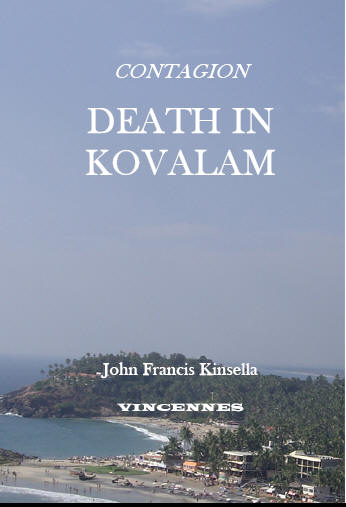
|
The disease is diagnosed as
cholera, panic sets in when tourists start to
fall ill with the deadly infection, just as the
tourist season is getting into the full swing of
the festive season. |
|
|
|
|
|
|
THINGS ARE LOOKING
BAD AT THE FED |
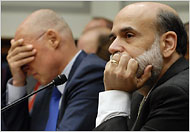 |
The
Fed ponders a solution for
Fannie
Mae
and
Freddie Mac
as the mortgage firms are
hit hard by the mortgage
crisis. Their shares have
plummeted and borrowing
costs are rising as
investors worry that the
companies will require huge
recapitalization with the
risk Fannie and Freddie
themselves may default on
their debt.
Fannie Mae and
Freddie Mac are
sponsored by the US
government, but owned by
shareholders. They buy
mortgages, package them into
securities and sell them on
to investors. They stand
behind three-quarters of all
new US mortgages. The
Federal National Mortgage
Association,
nicknamed Fannie Mae, was
created during the
Great Depression of
the 1930s to ensure
sufficient funds were made
available to mortgage banks.
In 1970, the Federal Home
Mortgage Corporation,
nicknamed
Freddie Mac, the
country's second largest
mortgage lender, was
created.
|
US NORTHERN
ROCK IN
PASADENA
CALIFORNIA? |
|
|
The federal
government seized
control of
Pasadena-based
IndyMac Bank on
Friday in what
regulators called
the second-largest
bank failure in U.S.
history. Citing a
massive run on
deposits, regulators
shut its main branch
three hours early,
leaving customers
stunned and upset.
One woman leaned on
the locked doors,
pleading with an
employee inside:
"Please, please, I
want to take out a
portion." All she
could do was read a
two-page notice
taped to the door
Regulators said
deposits of up to
$100,000 were safe
and insured by the
FDIC. The agency's
insurance fund has
assets of about $52
billion. |
|
Faked photos of
Iranian missiles?
Iran up the anti as
oil reaches $146 and
markets plunge even
further. |
|
The
Jerusalem Post reported
Israel Air Force (IAF) war
planes are practicing in
Iraqi airspace and land in
US airbases on the country
as preparation for a
potential strike on Iran,
sources in the Iraqi Defense
Ministry told a local news
network, Friday. The report,
carried also by Iranian news
outlets, claimed that
recently massive nocturnal
activity by IAF craft was
noted in several American
held airbases, including
measures by the US army to
increase security around the
bases. The Jerusalem Post
could not confirm the
veracity of the report.
According to the sources,
former military officers in
the Anbar province said IAF
jets arrive during the night
from Jordanian airspace,
enter Iraq's airspace and
land on a runway near the
city of Hadita. The sources
estimated the jets were
practicing for a raid on
Iran's nuclear sites. |
|
|
|
|
|
The
Halifax house price data for
June revealed a 2% fall in house
prices for the month or a loss
of value of £3,500 from May,
house prices are now down 6.1%
on an seasonally adjusted basis,
which is a far cry from March
2008 when the bank's chief
economist was painting a bullish
picture for house prices.
However the housing market is in
CRASH
mode for the quarter April to
June 08, as forecast by the
Market Oracle in
November
2007
-
"house
prices could register a drop of
as much as 5% in the quarter
April 08 to June 08"
UK house
prices have fallen for nine
straight months http://www.capitaleconomics.com
Capital Economics, forecasts a
35 per cent decline in house
prices by the end of 2010, with
a mortgage drought that means
that just 750,000 transactions
will be completed in 2008 - down
almost 40 per cent on last year,
and the weakest figure on
record. |
 |
|
In the UK commuters abandon cars
for public transport as oil
reaches new heights. Has the
turning point been reached and
common sense replaces four
wheels at any price or has the
British public begun to feel the
pinch in the pockets? |
|
|
|
The
Independent New York Times will be pleased to
receive your articles and comments. Please
contact our editorial desk at the following
address
sumpinein@gmail.com
and we shall endeavor to answer you promptly. |
|
|
|
|
THINGS DON'T LOOK
GOOD FOR BROWN EITHER |
|
Spot the bubble -
Shanghai Composite Index
2004-2008 by Bloomberg
27 June. The main
Chinese index is looking
grim as it continues its
long plunge as the
Olympics approach. It's
normal, after all who
buys Chinese goods - the
USA stupid! |
|
The Dow
Jones dived a further 350 points
Thursday, giving America’s key
economic benchmark its worst
June performance since the Great
Depression, as oil hit a record
and analysts said that the
fallout from the credit crunch
was far from over. With crude
hitting a new intraday high at
$142.99 a barrel, the market
grew increasingly worried about
the impact of surging
commodities prices on consumers.

|
Britain's
biggest mortgage
lender disclosed
yesterday that
it has almost £5
billion of
problem home
loans on its
books as it gave
a downbeat
forecast for
this year's
housing market.
HBOS predicted a
9 per cent fall
in property
prices this
year, up from
its previous
predictions of a
“mid-single
digit” decline,
and wrote down
£100 million on
its own
investments in
the troubled
house building
sector. The
price of a crude
oil in New York
barreled to a
record of
$139.64 as Libya
threatened to
cut its output
and Chakib
Khelil, the Opec
president, said
that oil could
hit $170 a
barrel over the
summer if, as
expected, the
European Central
Bank increases
interest rates,
in a move that
would further
depress the
dollar. |
|
|
|
|
Mandela rocks whilst Mugabe kills |
|
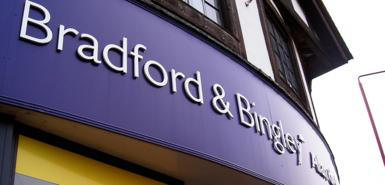 |
|
The Bradford & Bingley
plunges into a Northern Rock crisis as shares
continue to fall. |
 |

|
|
The largest consumers
of oil are, for now at least, the
world's advanced economies. This year
developed economies, or those members of
the Organisation for Economic
Co-operation and Development, are
expected to consumer 56pc of the roughly
87m barrels per day (bpd) used each day,
leaving the rest of the world to use the
rest. In 2008, the US alone is expected
to consume a little over 20m bpd,
followed by China with 7.9m bpd and
Japan at 5m bpd. The European member
countries of the OECD consume 15.3m bpd
of oil-related products. |
|
| On
the eve of the Olympics China vetoes
Zimbabwe sanctions |
|
 |
| Russia and
China wielded their veto to kill a
resolution imposing UN sanctions on
President Mugabe and his inner circle in
a defining vote in the 15-nation
council. Another shameful act of
political self interest by so called
great powers, in fact totalitarian
states. |
|
|